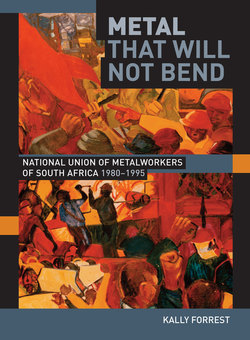Читать книгу Metal that Will not Bend - Kally Forrest - Страница 19
На сайте Литреса книга снята с продажи.
Chapter Three Power in unity: 1980–1987
ОглавлениеOur union organises mostly metal workers … This has made it easier to assist our workers efficiently with problems they face in the metal industry,’ explained a Mawu booklet. ‘At the same time our union does not believe in encouraging workers to become splintered in their organisations. That is why our union has always tried to work in close cooperation with other industrial unions which share our principles and to fight for broader working class unity.’1
From the outset, the independent unions, through the coordination of Tuacc, had a vision of strong industrial unions where a national worker unity, and identity, could be forged. Bringing workers together in large industrial unions meant uniting people who were racially, ethnically and regionally divided across urban and rural areas and bantustans. Organisation nationally would restrict employers’ ability to exploit racial and regional differences in wages and working conditions. In view of the country’s highly monopolised economy which brought many workers under the same ownership and linked them through interconnected production, this strategy made further sense.
Organising by industries also brought power. Strike action across the auto sector, for example, could paralyse it, force concessions, and ultimately enable the union to raise issues of industrial restructuring. It was for these reasons that the Fosatu unions adopted union unity as a central policy at its founding congress in 1979.
